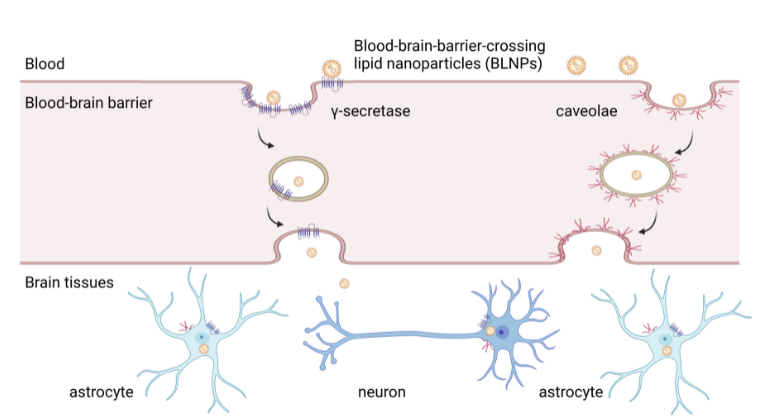New Lipid Nanoparticle Platform Delivers mRNA to the Brain Through the Blood-Brain Barrier
The findings, demonstrated in mouse models and isolated human brain tissue, could expand treatment options for neurological and psychiatric diseases

Blood–brain-barrier-crossing lipid nanoparticles (BLNPs) effectively and safely deliver mRNA to the brain via systemic administration.
Credit: Created with BioRender.com in the lab of Yizhou Dong, PhD, at the Icahn School of Medicine at Mount Sinai
Scientists at the Icahn School of Medicine at Mount Sinai have developed a lipid nanoparticle system capable of delivering messenger RNA (mRNA) to the brain via intravenous injection, a challenge that has long been limited by the protective nature of the blood-brain barrier.
The findings, in mouse models and isolated human brain tissue, were published in the February 17 online issue of Nature Materials [10.1038/s41563-024-02114-5]. They demonstrate the potential of this technology to pave the way for future treatments for a wide range of conditions such as Alzheimer’s disease, amyotrophic lateral sclerosis, brain cancer, and drug addiction.
The blood-brain barrier serves as a protective shield, preventing many substances—including potentially beneficial therapies—from reaching the brain. While previous research from Mount Sinai introduced a platform for transporting large biomolecules such as proteins and oligonucleotides into the central nervous system, this new study focuses on a different approach: using specially designed lipid nanoparticles to transport mRNA across the barrier.
Getting mRNA into the brain could allow scientists to instruct brain cells to produce therapeutic proteins that can help treat or prevent disease by replacing missing proteins, reducing harmful ones, or activating the body’s defenses.
“Our study shows that these blood-brain barrier-crossing lipid nanoparticles (BLNPs) can safely and efficiently deliver mRNA into the brain,” says co-corresponding senior author Yizhou Dong, PhD, Professor of Immunology and Immunotherapy, and a member of the Icahn Genomics Institute and the Marc and Jennifer Lipschultz Precision Immunology Institute, at the Icahn School of Medicine at Mount Sinai. “This could open up opportunities to use mRNA-based therapies for a variety of neurological and psychiatric disorders.”
The research team designed and tested a library of lipids to optimize their ability to cross the blood-brain barrier. Through a series of structural and functional analyses, they identified a lead formulation, termed MK16 BLNP, that exhibited significantly higher mRNA delivery efficiency than existing lipid nanoparticles approved by the Food and Drug Administration (FDA). This system takes advantage of natural transport mechanisms within the blood-brain barrier, including caveolae- and γ-secretase-mediated transcytosis, to move nanoparticles across the barrier, say the investigators.
In studies using mouse models of disease, the BLNP platform successfully delivered therapeutic mRNAs to the brain, demonstrating its potential for clinical application.
“Our lipid nanoparticle system represents an important step in the effort to develop mRNA-based treatments for central nervous system disorders,” says Dr. Dong. “The study provides proof of concept that such an approach is viable and could be adapted for a range of diseases where gene therapy or mRNA therapeutics might play a role.”
The researchers note that additional studies are needed to assess long-term safety and efficacy, including toxicology studies in accordance with FDA guidelines. Future research will focus on refining the technology for clinical translation.
“Our findings highlight the potential of lipid nanoparticles in overcoming one of the major challenges in treating brain diseases,” says co-corresponding senior author Eric J. Nestler, MD, PhD, Director of The Friedman Brain Institute, Dean for Academic Affairs, and Nash Family Professor in the Nash Family Department of Neuroscience at the Icahn School of Medicine at Mount Sinai, and Chief Scientific Officer of the Mount Sinai Health System. “We are very excited to continue evaluating this novel platform for broader therapeutic applications.”
The paper is titled “Blood–brain-barrier-crossing lipid nanoparticles for mRNA delivery to the central nervous system.”
The study’s authors, as listed in the journal, are Chang Wang, Yonger Xue, Tamara Markovic, Haoyuan Li, Siyu Wang, Yichen Zhong, Shi Du, Yuebao Zhang, Xucheng Hou, Yang Yu, Zhengwei Liu, Meng Tian, Diana D. Kang, Leiming Wang, Kaiyuan Guo, Dinglingge Cao, Jingyue Yan, Binbin Deng, David W. McComb, Ramon E. Parsons, Angelica M. Minier-Toribio, Leanne M. Holt, Jiayi Pan, Alice Hashemi, Brian H. Kopell, Alexander W. Charney, Eric J. Nestler, Paul C. Peng and Yizhou Dong.
The study was supported by the National Institute of General Medical Sciences (R35GM144117), the National Institute on Drug Abuse (P01DA047233), and Biogen.
About the Icahn School of Medicine at Mount Sinai
The Icahn School of Medicine at Mount Sinai is internationally renowned for its outstanding research, educational, and clinical care programs. It is the sole academic partner for the eight- member hospitals* of the Mount Sinai Health System, one of the largest academic health systems in the United States, providing care to New York City’s large and diverse patient population.
The Icahn School of Medicine at Mount Sinai offers highly competitive MD, PhD, MD-PhD, and master’s degree programs, with enrollment of more than 1,200 students. It has the largest graduate medical education program in the country, with more than 2,600 clinical residents and fellows training throughout the Health System. Its Graduate School of Biomedical Sciences offers 13 degree-granting programs, conducts innovative basic and translational research, and trains more than 500 postdoctoral research fellows.
Ranked 11th nationwide in National Institutes of Health (NIH) funding, the Icahn School of Medicine at Mount Sinai is among the 99th percentile in research dollars per investigator according to the Association of American Medical Colleges. More than 4,500 scientists, educators, and clinicians work within and across dozens of academic departments and multidisciplinary institutes with an emphasis on translational research and therapeutics. Through Mount Sinai Innovation Partners (MSIP), the Health System facilitates the real-world application and commercialization of medical breakthroughs made at Mount Sinai.
-------------------------------------------------------
* Mount Sinai Health System member hospitals: The Mount Sinai Hospital; Mount Sinai Beth Israel; Mount Sinai Brooklyn; Mount Sinai Morningside; Mount Sinai Queens; Mount Sinai South Nassau; Mount Sinai West; and New York Eye and Ear Infirmary of Mount Sinai.